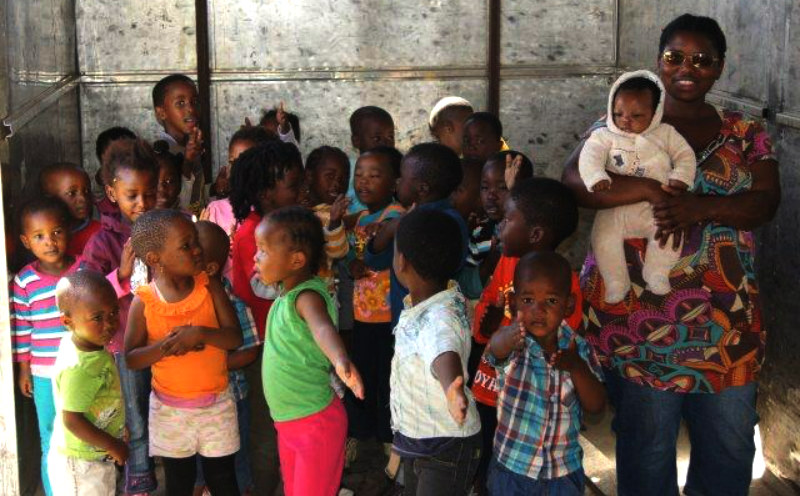Imagine yourself transported to the very heart of the sprawling informal settlement that is Site C in Khayalitsha. Right in front of you, you will find three shacks built around a postage stamp size of open ground. This is the home of a very special lady called Mrs. Nomatha Velayi whose commitment and service to her community – and especially its children – is legendary. She is a beacon of hope amidst the poverty, hunger and deprivation that stalks these settlements. Mrs. Velayi moved to Cape Town in 1999 after her husband died. No sooner had she moved into her shack than she rounded up some street children who were sleeping rough and took them into her care. She is very proud of the fact that several of them have been rehabilitated and passed their matric.
Various church groups helped her with food and arranged outings. With Mrs. Velayi in charge, the local police had no option but to transport the children on these trips in the police van. By 2003 she was running a pre-school too, from her home relying on donations to help her keep going. Currently she is running the pre-school in the mornings for the toddlers, aftercare for primary school children in the afternoons to keep them safe and off the streets, and has 10 children living with her permanently now, 3 of whom are disabled. If parents or caregivers need to be away for any reason – like a funeral in the Eastern Cape, or work at night in the entertainment industry – Mrs. Velayi will take the children in. Her next challenge came when she found that parents wanted to share their family problems with her, especially when it came to coping with HIV/AIDS and its consequences to a family. So open were they to disclosure of the infection that Mrs. Velayi runs support groups from her school in the evenings with the approval of the community. In turn the groups are doing beadwork, sewing, vegetable gardening and traditional dancing. The latter group performed at the opening of parliament celebrations. It is obvious that being able to talk openly about such life threatening issues is of great comfort and support to the people involved and a breakthrough in the wall of silence usually surrounding such a diagnosis. This openness has led to many grannies attending support groups too, especially those who have lost their children to AIDS, leaving them to care for their grandchildren.
Mrs. Velayi was donated a container and a wooden wendy house for her school but she had nowhere to put them. They are presently on the grounds of the adjoining primary school with which she has a good working relationship. The school refers children in need of aftercare to her and provides her with bread so that she can provide snacks in the afternoon. The odds against her achieving her dream of having a plot of land big enough to support her children in suitable accommodation, and being registered with the Department of Social Development (DSD) and in receipt of a subsidy seem almost insurmountable. The municipality cannot find a plot of land big enough for her purposes. The DSD cannot register her because of her inadequate infrastructure. She does not have the capital to upgrade it, so round and round and round she goes. It reflects badly on government departments that they have not assessed and acted on the merits of this project. People who visit her school are so impressed by what they see that they inevitably give generously to her cause.
A few years ago the SABC featured her in a short documentary, highlighting her tenacity in the face of all kinds of odds, and gave her R10 000 for equipment. But this income, though lifesaving, is too erratic. What to do? Her community supports and reveres her, her children love her, people who meet her are dumbfounded by her Mother Theresa-like commitment and what she has and is achieving. Her leadership skills are only too obvious when you see her at work. Last year she brought her problems to ELSO (Early Childhood Development). The two facilitators immediately declared their commitment to supporting her and seeing her registered as soon as possible.
Until the land situation is solved, ELSO has provided some furniture and equipment, and has sent Mrs Velayi on a teacher–training course which is part of the registration process. More importantly, it is providing dry food supplies, fresh fruit and vegetables on a monthly basis.
Just Charity supported Mrs. Velayi by supplying her with a Nutech classroom which included a full kitchen with appliances and bathroom facilities (including toilets and running water), as well as a playground, fencing and dry supplies (books, crayons, etc).
Zamuxolo Educare Centre

Zamuxolo Educare Centre, Khayalitsha Site C
© Just Charity - All rights reserved | Privacy Policy | Website design by Vanessa Rossouw
